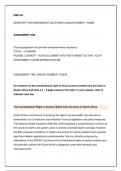IRM1501
SEMESTER TWO ASSIGNMENT QUESTIONS UNIQUE NUMBER: 193286
ASSIGNMENT ONE
Discuss plagiarism and provide examples where necessary.
TOTAL = 10 MARKS
PLEASE CONVERT YOUR DOCUMENT INTO PDF FORMAT SO THAT YOUR
ASSIGNMENT CAN BE MARKED ONLINE.
ASSIGNMENT TWO UNIQUE NUMBER: 153439
Do research on the constitutional right to have access to health care services in
South Africa and write a 2 – 3-page essay on the topic. In your answer, refer to
relevant case law.
The Constitutional Right to Access Health Care Services in South Africa
South Africa's commitment to ensuring the right to access health care services is
entrenched in its Constitution and reflected in various legislative and policy measures.
The National Health Insurance (NHI) Bill, which proposes a comprehensive overhaul of
the country's health care system, aims to provide universal health coverage. However,
the Bill’s proposed limitations on health care access for asylum seekers have sparked
significant debate regarding its constitutionality. We are critically analyzing the
implications of the NHI Bill, focusing on the constitutional rights of asylum seekers and
the potential conflicts with South Africa's obligations under both domestic and
international law.
, 1. The Constitutional Framework
South Africa's Constitution enshrines the right to health care in Section 27, which
asserts that "everyone has the right to have access to... health care services." This
provision mandates that the state must take reasonable legislative and other
measures, within its available resources, to progressively realize these rights
(Constitution of the Republic of South Africa, 1996). The principle of progressive
realization acknowledges that while immediate full realization may not be feasible, the
state must move steadily toward achieving these goals (Moyo, Botha & Govindjee,
2022).
Moreover, Section 28 of the Constitution specifically protects the rights of children,
stating that "every child has the right to... basic health care services" (Constitution of
the Republic of South Africa, 1996). This provision underscores the need for special
protection for children, particularly in vulnerable situations such as those involving
asylum seekers (Buchner-Eveleigh, 2014).
2. The National Health Insurance Bill and Asylum Seekers
The NHI Bill aims to establish a National Health Insurance Fund that will provide
comprehensive health care services to South African citizens, permanent residents,
refugees, and, under certain conditions, specific categories of foreigners (Moyo, Botha
& Govindjee, 2022). However, Clause 4 of the Bill restricts asylum seekers' access to
only emergency medical services and treatment for notifiable conditions, excluding
them from more comprehensive health services that are available to other categories
of non-citizens.
The restriction of health services under the NHI Bill raises concerns about whether it
constitutes a retrogressive measure. Retrogressive measures are those that reduce or
eliminate existing rights and entitlements. In the context of Section 27, the state is
prohibited from taking steps that would unduly diminish the access previously available
to marginalized groups, including asylum seekers (Moyo, Botha & Govindjee, 2022).
The NHI Bill’s limitations on health services for asylum seekers could be viewed as a
rollback of the current protections afforded under the National Health Act (NHA), which
provides free primary health care and subsidized hospital care to all individuals,
regardless of their nationality or immigration status (Moyo, Botha & Govindjee, 2022).




